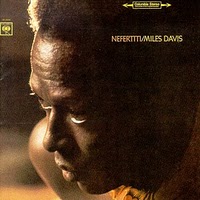 Recorded only a few weeks after Sorcerer, Miles Davis cuts the music even furthur back so often the polished white bone behind the sound is revealed: this gives the music a gleaming purity but also a sense of loss, a lot of that which gives music its emotional meaning has been jetisoned. Herbie Hancock is perhaps the most Milesian of Davis’s piano/keyboard players (perhaps the most Milesian of all Davis’s collaborators): although tempermentally different, lacking Davis’s moody intensity, but having a lightness of touch that Davis lacked, Hancock is the musician who seems most at ease in parring everything back, only playing one note where other musicians would have played five. On this album there are only a couple of tracks where he takes the traditional role in the rhythm section, instead only coming forward, like the horn players, to state the theme at the beginning and end of the number and for his featured section. His playing, as in all the mid-1960s Quintet recordings, shines with an astonishing precision, the sense that each note is fully determined by his conception of the piece, that it is the only possible choice, the only note that could have been played. Tony Williams plays with an astonishing agression (listen to Nefertiti, Hand Jive, Madness): as with Hancock, a good argument could be made that the recordings with the Miles Davis Quintet in the mid-1960s contain his greatest performances. Ron Carter, although impecable, plays with a greater simplicity compared to the Sorcerer sessions (but then his bass on Sorcerer is perhaps the high point of his career) – it could be argued that this is a good thing, but for me it is part of the release of the internal tension that made the previous Quintet studio recordings so remarkable. The opening title track is a fascinating experiment where the two horn players, rather than the rhythm section, provide the basic structure of the piece, repeating the basic melody time after time: while this gives the other three musicians great freedom to operate it also means a complete loss in the playing of Davis and Shorter (who throughout the rest of the album are superb) – and with repeated listenings I personally find it annoying. Compared to the previous studio albums Nefertiti shows a certain loss in its texture, but in hindsight can see it as a fascinating part of Davis’s continual evolution, one that is already pointing to In a Silent Way. –Nick
Recorded only a few weeks after Sorcerer, Miles Davis cuts the music even furthur back so often the polished white bone behind the sound is revealed: this gives the music a gleaming purity but also a sense of loss, a lot of that which gives music its emotional meaning has been jetisoned. Herbie Hancock is perhaps the most Milesian of Davis’s piano/keyboard players (perhaps the most Milesian of all Davis’s collaborators): although tempermentally different, lacking Davis’s moody intensity, but having a lightness of touch that Davis lacked, Hancock is the musician who seems most at ease in parring everything back, only playing one note where other musicians would have played five. On this album there are only a couple of tracks where he takes the traditional role in the rhythm section, instead only coming forward, like the horn players, to state the theme at the beginning and end of the number and for his featured section. His playing, as in all the mid-1960s Quintet recordings, shines with an astonishing precision, the sense that each note is fully determined by his conception of the piece, that it is the only possible choice, the only note that could have been played. Tony Williams plays with an astonishing agression (listen to Nefertiti, Hand Jive, Madness): as with Hancock, a good argument could be made that the recordings with the Miles Davis Quintet in the mid-1960s contain his greatest performances. Ron Carter, although impecable, plays with a greater simplicity compared to the Sorcerer sessions (but then his bass on Sorcerer is perhaps the high point of his career) – it could be argued that this is a good thing, but for me it is part of the release of the internal tension that made the previous Quintet studio recordings so remarkable. The opening title track is a fascinating experiment where the two horn players, rather than the rhythm section, provide the basic structure of the piece, repeating the basic melody time after time: while this gives the other three musicians great freedom to operate it also means a complete loss in the playing of Davis and Shorter (who throughout the rest of the album are superb) – and with repeated listenings I personally find it annoying. Compared to the previous studio albums Nefertiti shows a certain loss in its texture, but in hindsight can see it as a fascinating part of Davis’s continual evolution, one that is already pointing to In a Silent Way. –Nick


